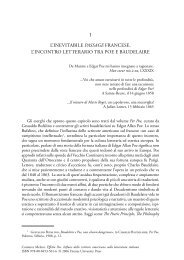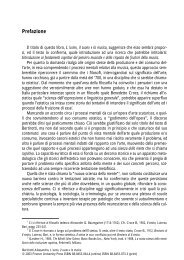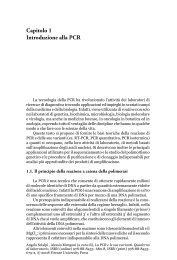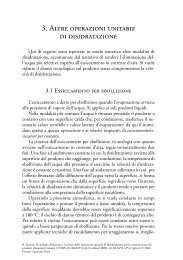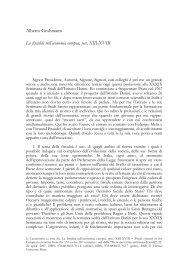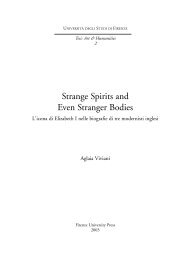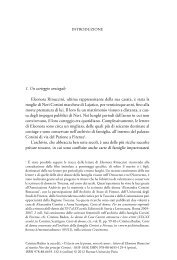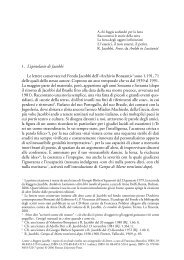biblioteca di studi di filologia moderna – 10 - Firenze University Press
biblioteca di studi di filologia moderna – 10 - Firenze University Press
biblioteca di studi di filologia moderna – 10 - Firenze University Press
Create successful ePaper yourself
Turn your PDF publications into a flip-book with our unique Google optimized e-Paper software.
220<br />
arianna antonielli<br />
loro potenza. a tale assunto, mi sembra necessario e interessante riportare<br />
una <strong>di</strong>versa prospettiva, più tecnico-informatica. secondo catherine<br />
decker, infatti, un altro dei problemi legati alla rappresentazione <strong>di</strong> testi<br />
non canonici in rete è parzialmente legato «to the lack of copyright-free,<br />
modern-font reprints of such works», in quanto «romantic-era fonts are a<br />
challenge to many types of optical-character-recognition (ocr) software,<br />
making extensive page-by-page e<strong>di</strong>ting needed after scanning to correct<br />
each misrecognized character». da ciò deriva che <strong>di</strong>gitalizzare un testo<br />
non canonico <strong>di</strong>viene un’impresa molto lunga e <strong>di</strong>fficile, senza alcuna sicurezza<br />
<strong>di</strong> avere un compenso da tale investimento; sicurezza che invece<br />
può garantire un’opera classica. non solo, la decker approfon<strong>di</strong>sce la<br />
questione osservando che, «[…] because many scholarly reprint collections<br />
of romantic-era novels […] reproduce the original fonts of the romantic-era,<br />
they are not good can<strong>di</strong>dates for scanning with the sort of ocr<br />
software that is rea<strong>di</strong>ly available and reasonably priced. Huge repositories<br />
of texts on microfilm and microprint also have fonts resistant to clean<br />
optical-character recognition» 51 .<br />
al <strong>di</strong> là <strong>di</strong> simili problematiche <strong>di</strong> pertinenza strettamente tecnicoinformatica,<br />
nel suo Crossing Old Barriers: The WorldWideWeb, Academia,<br />
and the Romantic Novel, la decker sostiene inoltre che il web offusca<br />
e confonde ulteriormente la linea <strong>di</strong> demarcazione tra testi canonici e<br />
non canonici. È sua opinione che internet abbia contribuito ad incrementare<br />
tale confusione in particolare in merito al canone del romanzo<br />
romantico e osserva quanto il web abbia solo minimamente avviato<br />
il processo <strong>di</strong> inclusione in rete <strong>di</strong> romanzi non canonici appartenenti<br />
all’epoca romantica, soprattutto per quanto concerne le opere scritte<br />
dalle autrici dell’epoca. alcune rare eccezioni a tale assunto sono offerte<br />
dal sito stesso della decker, British Women’s Novels: A Rea<strong>di</strong>ng List,<br />
1777-1818 (), che si propone come<br />
una non convenzionale congiunzione tra bibliografia ipertestuale <strong>di</strong> romanzi<br />
romantici non canonici e commenti ai romanzi stessi; e altri siti<br />
quali, ad esempio, Procyon: The Academic SF Website () <strong>di</strong> John collick, Romantic Links,<br />
Homepages, and Electronic Texts ()<br />
<strong>di</strong> michael gamer e The Gothic: Materials for Study, A Hypertext<br />
Anthology () <strong>di</strong> christine<br />
ruotolo, nelle cui pagine è possibile trovare alcuni testi elettronici<br />
fuori dal canone romantico 52 .<br />
altri siti web che collegano autori canonici e non canonici dell’era romantica<br />
sono ad esempio The Republic of Pemberley (), un sito web de<strong>di</strong>cato non solo a Jane austen ma anche ad altri<br />
autori non canonici suoi contemporanei (in particolare nella sezione intitolata<br />
Slightly Off the Austen Track), con una community <strong>di</strong> Pemberleans<br />
molto attiva e interattiva.<br />
<strong>di</strong> impatto ancora più forte e sovversivo sono quei siti che intendono<br />
<strong>di</strong>chiaratamente minare alla ra<strong>di</strong>ce il tra<strong>di</strong>zionale canone maschile, co-




